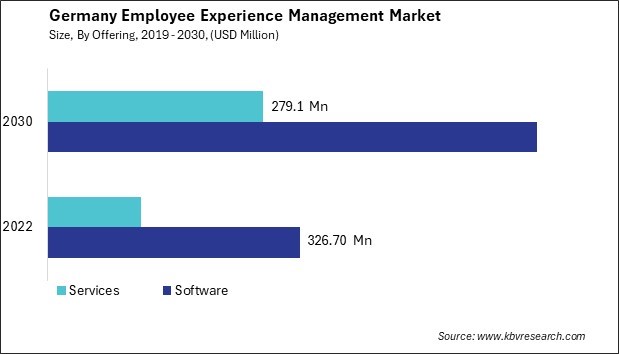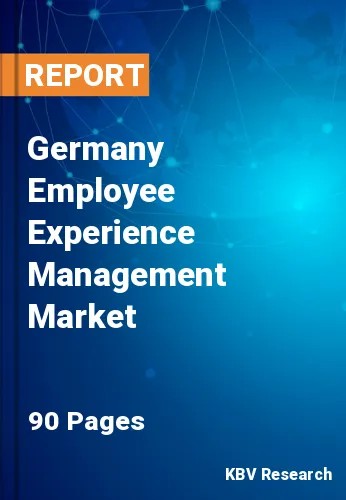The Germany Employee Experience Management Market size is expected to reach $913.2 Million by 2030, rising at a market growth of 9.5% CAGR during the forecast period.
In recent years, the Germany employee experience management market has seen significant growth driven by several key factors. Firstly, there has been a growing recognition among businesses in Germany of the importance of prioritizing the employee experience as a strategic imperative. An increasing number of organizations recognize the criticality of a positive employee experience in cultivating a motivated as well as productive workforce that contributes to the success of the business, as well as in attracting and retaining top talent.

Secondly, the workplace's digital transformation has accelerated the demand for employee experience management (EXM) solutions in Germany. As businesses adopt digital technologies to enable remote work, collaboration, and communication, there is a need for EXM tools that can support these new ways of working while maintaining a positive employee experience. This has led to increased investments in EXM platforms that offer features such as virtual collaboration tools, employee feedback mechanisms, and digital employee engagement programs.
Furthermore, the changing demographics of the workforce in Germany, including the rise of millennials and Generation Z, have contributed to the growing importance of EXM in the country. A supportive work environment, work-life balance, and opportunities for career advancement are elements that younger generations of employees recognize. As a result, businesses are turning to EXM solutions to create a workplace culture that aligns with the expectations of these younger employees and fosters a sense of belonging and purpose.
Furthermore, the global health crisis has emphasized the criticality of employee mental health and well-being within the professional environment, resulting in a heightened emphasis on comprehensive employee experience management approaches that prioritize the wellness of staff. With the blurred boundaries between work and personal life in remote work setups, businesses in Germany have recognized the need to support their employees' physical, mental, and emotional well-being. This has led to the adoption of EXM solutions that offer resources for stress management, work-life balance, and mental health support, aiming to create a supportive and inclusive work culture. Therefore, as businesses in Germany continue to prioritize employee engagement and well-being, the demand for innovative EXM solutions that can support these objectives is expected to grow, shaping the future of the employee experience management market in the country.
Germany's telecom sector is undergoing rapid expansion driven by several key factors reshaping the industry landscape. One of the primary drivers of Germany's rapidly expanding telecom sector is the increasing demand for high-speed internet and advanced digital services. As digitalization continues to transform various industries and consumer behaviors, there is a growing need for reliable and high-performance telecom infrastructure to support the increasing data traffic and connectivity requirements. This has led to significant investments in fiber-optic networks, 5G technology, and broadband infrastructure to expand coverage and enhance network capabilities across the country.
Furthermore, the rise of new technologies and digital platforms drives innovation and competition in the telecom sector. Companies in Germany are leveraging technologies like the IoT, cloud computing, and 5G to offer innovative services and solutions to businesses and consumers. This has led to a proliferation of new telecom offerings, including advanced mobile services, IoT connectivity solutions, and digital transformation services, catering to the market's evolving needs.
Furthermore, the pace of technological invention in the telecom sector drives the demand for EXM tools to support digital transformation initiatives and upskill the workforce. As telecom companies in Germany adopt new technologies such as 5G, IoT, and cloud computing, there is a need to equip employees with the skills as well as knowledge to use these technologies effectively. EXM tools that offer learning and development features, performance management capabilities, and feedback mechanisms are essential for ensuring that employees are equipped to succeed in a rapidly evolving technological landscape. These tools facilitate the assessment and enhancement of the employee experience, the identification of improvement opportunities, and the deployment of initiatives aimed at increasing employee loyalty and satisfaction.
The use of EXM services in training and development reflects a growing emphasis on providing personalized and engaging learning experiences that align with employees' needs, preferences, and career aspirations. One of the keyways EXM services are being used in training and development in Germany is through integrating employee feedback and sentiment analysis into learning programs. By leveraging EXM platforms that offer robust feedback mechanisms and sentiment analysis tools, companies can gather insights into employees' learning experiences, identify areas for improvement, and tailor training programs to better meet their needs. This data-driven approach enables companies to create more targeted and effective learning experiences that resonate with employees and drive better learning outcomes.
Furthermore, EXM services personalize training and development programs based on employees' roles, skills, and career goals. Through EXM platforms that offer personalized learning paths, adaptive learning algorithms, and skills assessments, companies in Germany can deliver customized training content that is relevant and meaningful to each employee. As an indication of dedication to the growth and development of each employee, this individualized strategy improves the learning experience and boosts employee engagement and motivation.
Furthermore, EXM services are significantly contributing to the cultivation of a corporate environment in Germany that values ongoing education and progress. By utilizing EXM platforms to provide ongoing feedback, recognition, and rewards for learning achievements, companies can create a learning culture where employees feel empowered to take ownership of their development and seek new learning opportunities. This, in turn, contributes to higher levels of employee satisfaction, retention, and overall organizational performance. Therefore, the aforementioned factors will propel the growth of the market.

The Germany employee experience management market is characterized by diverse companies offering innovative solutions to enhance employee experience across various industries. These companies provide a wide array of EXM tools and services to improve employee engagement, satisfaction, and productivity in the workplace.
Global technology leaders such as SAP, through its SAP SuccessFactors platform, and Microsoft, with its Microsoft Viva platform, are major players in the Germany market. These companies offer comprehensive EXM solutions that integrate with their broader suite of workplace productivity and collaboration tools, providing businesses with a unified platform for managing the entire employee experience lifecycle, from onboarding to performance management and employee well-being.
In addition to global technology giants, specialized EXM solution providers cater to the unique needs of businesses in Germany. These companies focus on delivering targeted EXM solutions tailored to specific industries or organizational requirements. For example, Qualtrics, now part of SAP, offers a comprehensive EXM platform that includes employee feedback, surveys, and sentiment analysis tools. It allows businesses to gather real-time insights into the employee experience and take proactive measures to improve it.
Furthermore, human capital management (HCM) software providers such as Workday and ADP offer EXM modules as part of their broader HCM suites. These companies provide businesses with integrated solutions for managing all employee lifecycle aspects, including recruitment, onboarding, performance management, and employee engagement. Their EXM offerings often include employee self-service portals, social collaboration tools, and performance analytics to enhance the overall employee experience.
Moreover, specialized EXM consulting firms and service providers in Germany offer expertise in designing and implementing employee experience strategies. These companies work closely with businesses to assess their current employee experience, identify areas for improvement, and develop tailored EXM solutions that align with their organizational goals and culture. They often provide employee surveys, organizational assessments, and change management support to help businesses optimize their employee experience initiatives.
In conclusion, the Germany employee experience management market is characterized by global technology leaders, specialized EXM solution providers, HCM software vendors, and consulting firms, each offering unique capabilities to enhance the employee experience. As businesses in Germany continue to prioritize employee engagement and well-being, the demand for innovative EXM solutions and services is expected to grow, further expanding the landscape of the market in the country.
By Offering
By Industry
Our team of dedicated experts can provide you with attractive expansion opportunities for your business.

